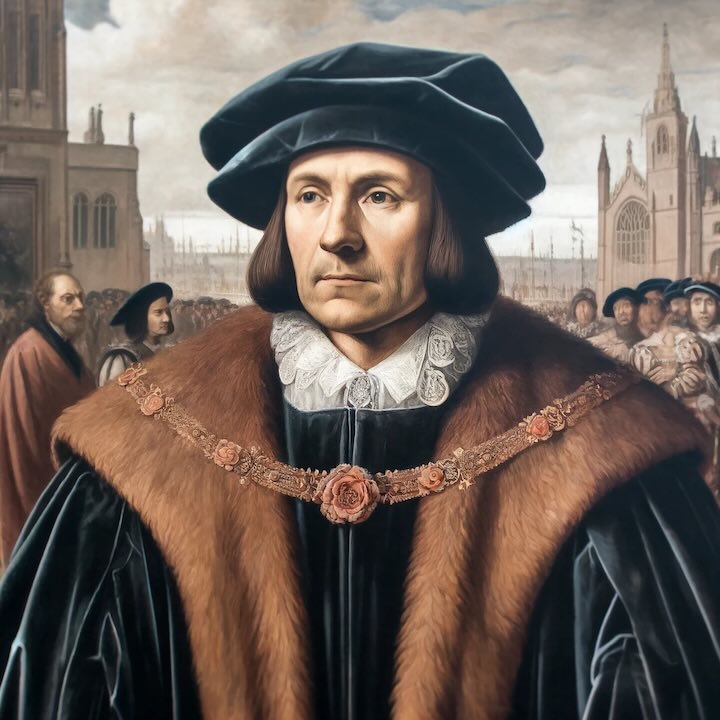Saint Sir Thomas More (1478-1535)

Sir Thomas More, an English scholar, lawyer, and statesman, held various influential roles in the government of King Henry VIII, including Lord Chancellor. More was deeply loyal to the Catholic Church and opposed Henry’s separation from Rome. He resigned in protest and, when he refused to recognize the king’s supremacy over the Church, was convicted of treason and executed in 1535. He was canonized as a saint in 1935.
Sir Thomas More was born on February 7, 1478, in London, England. He was the son of John More, a respected lawyer and judge, and it was under his father’s influence that Thomas received an exceptional education. After attending St. Anthony’s School in London, he continued his studies at Oxford University, where he developed a passion for literature and philosophy, particularly the works of Greek and Roman authors. He later pursued legal training at Lincoln’s Inn, one of the four Inns of Court in London, and was called to the bar in 1501, becoming an accomplished lawyer.
More’s career as a lawyer led him to public service, and he quickly rose through the ranks of the English government. He served King Henry VIII in numerous roles, demonstrating his capabilities as both a statesman and diplomat. Among his early assignments was his appointment as Under-Sheriff of London, where his fair judgment earned him widespread respect. More was soon elected to Parliament, where his political influence grew. He served as Speaker of the House of Commons, gaining a reputation for his sharp wit, intellect, and skillful diplomacy. One of his notable achievements in this role was his successful appeal for tax reductions during Henry VII’s reign, which showcased his dedication to justice and fairness.
In the early 1520s, More was sent as an ambassador to France to meet with King Francis I and the Holy Roman Emperor Charles V, representing England in critical diplomatic discussions. His skills in negotiation and diplomacy helped solidify his standing in Henry VIII’s court. More was appointed Chancellor of the Duchy of Lancaster, an influential role that gave him oversight of large areas of the English countryside, as well as control over legal and financial matters.
In 1529, following the fall of Cardinal Thomas Wolsey, More was appointed Lord Chancellor of England, the highest-ranking judicial officer in the land. However, his tenure as Lord Chancellor was brief and fraught with tension due to Henry VIII’s desire to divorce Catherine of Aragon and marry Anne Boleyn. More, a devout Catholic, strongly opposed Henry’s break with the Roman Catholic Church and his efforts to establish himself as the head of the Church of England.
Unable to support Henry’s actions, More resigned from his position as Lord Chancellor in 1532, citing ill health but motivated primarily by his disagreement with the king’s religious policies. More’s troubles worsened in 1534 when Parliament passed the Act of Supremacy, which declared Henry the Supreme Head of the Church of England. More refused to take the Oath of Supremacy, a refusal that was seen as an act of treason.
In 1535, More was arrested, tried for treason, and convicted based on perjured testimony. On July 6, 1535, he was executed by beheading at the Tower of London. His final words were reportedly, “I die the king’s good servant, but God’s first.”
More’s legacy lived on not only for his martyrdom but also for his intellectual contributions. He is perhaps best known for his book Utopia (1516), a political and philosophical work that described an ideal society based on reason and communal living.
In 1935, Sir Thomas More was canonized as a saint by the Roman Catholic Church, recognized for his steadfast loyalty to his faith and his ultimate sacrifice for his beliefs. Today, he is remembered as a man of conscience, scholarship, and principle.
 >
>